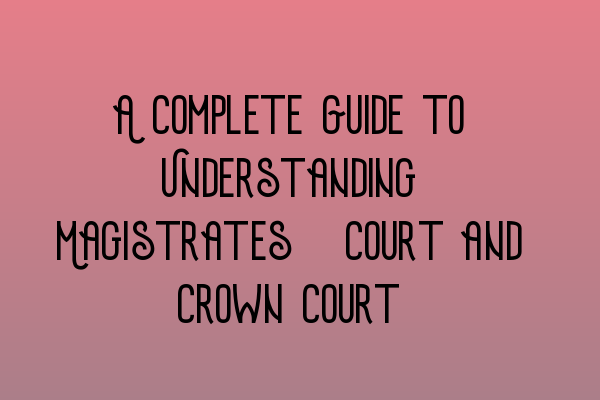A Complete Guide to Understanding Magistrates’ Court and Crown Court
If you find yourself facing criminal charges in the UK, it is essential to familiarize yourself with the legal system. Understanding the different courts and their functions can provide invaluable knowledge and help you navigate through the legal process successfully. In this comprehensive guide, we will delve into the intricacies of Magistrates’ Court and Crown Court, shedding light on their roles, procedures, and key differences. So, let’s get started!
Magistrates’ Court: Introduction and Key Features
The Magistrates’ Court is an integral part of the UK’s judicial system. It is responsible for dealing with the majority of criminal cases, from minor offenses to more serious crimes. Here are a few key features of the Magistrates’ Court:
1. Jurisdiction: The Magistrates’ Court has limited jurisdiction and can deal with summary offenses, such as minor assaults, theft, public order offenses, and traffic violations. They can also handle triable either-way offenses, which means they can choose to keep the case or send it to the Crown Court for trial.
2. Lay Magistrates: Magistrates, also known as Justices of the Peace, are volunteers from the local community who assist in deciding cases. They are not legally qualified but receive training to ensure a fair trial. A panel of three magistrates presides over most cases, with a legally qualified clerk providing guidance on points of law.
3. Sentencing Powers: The Magistrates’ Court has the power to impose custodial sentences of up to six months for a single offense and up to twelve months for multiple offenses. They can also issue fines, community orders, and binding over orders.
4. Speed and Efficiency: Magistrates’ Courts process a significant number of cases and aim for a swift resolution to maintain efficiency. Quick disposal of cases helps avoid unnecessary delays and ensures justice is served promptly.
Now that we have a basic understanding of the Magistrates’ Court, let’s explore the Crown Court in more detail.
Crown Court: Overview and Key Features
The Crown Court in the UK handles more serious criminal cases that fall outside the jurisdiction of the Magistrates’ Court. It deals with indictable offenses, which are generally considered more severe and carry longer potential sentences. Here’s what you need to know about the Crown Court:
1. Jurisdiction: The Crown Court has wider jurisdiction and can handle cases transferred from the Magistrates’ Court for trial. It primarily deals with serious crimes like murder, rape, robbery, and drug offenses. The court also hears appeals from the Magistrates’ Court regarding both conviction and sentencing.
2. Judge and Jury: Unlike the Magistrates’ Court, the Crown Court proceedings involve a judge and a jury. The judge presides over the trial, ensuring the proper application of the law, while the jury, usually comprising twelve members of the public, decides on the defendant’s guilt or innocence.
3. Sentencing Powers: The Crown Court has more extensive sentencing powers than the Magistrates’ Court. It can impose longer custodial sentences, issue life imprisonment, and provide a broader range of community orders, fines, and ancillary orders.
4. Complex Cases: The Crown Court deals with complex legal matters, where evidence and legal arguments require in-depth analysis. The court allows for a more comprehensive examination of facts to ensure a fair and just trial.
Understanding the Differences
Differentiating between the Magistrates’ Court and the Crown Court is crucial for anyone seeking legal guidance or facing criminal charges. Here are some key points highlighting the differences between the two:
1. Jurisdiction: The Magistrates’ Court handles less severe cases, while the Crown Court deals with more serious offenses.
2. Sentencing Powers: Magistrates’ Courts have limited sentencing powers, whereas the Crown Court can impose harsher punishments.
3. Lay Magistrates vs. Judge and Jury: Magistrates’ Courts employ lay magistrates, while the Crown Court comprises a judge and a jury.
4. Legal Complexity: The Crown Court handles complex cases requiring significant legal expertise, whereas Magistrates’ Courts typically deal with less legally intricate matters.
Conclusion
Navigating the legal system, especially when facing criminal charges, can be daunting. Understanding the roles and functions of Magistrates’ Court and Crown Court is essential to ensure you can make informed decisions and receive fair treatment throughout the legal process.
This complete guide has shed light on the key features and differences between Magistrates’ Court and Crown Court. Armed with this knowledge, you can approach your legal matter with confidence, knowing the system and its intricacies.
Remember, seeking professional legal advice from qualified solicitors who specialize in criminal law is crucial for a successful outcome.
